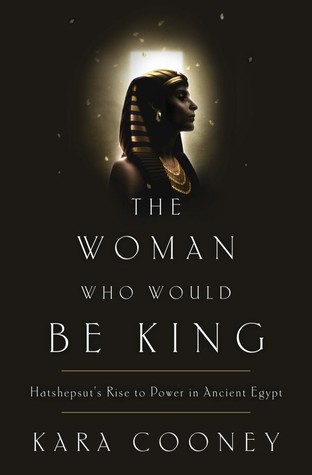Review: 'The Woman Who Would Be King' by Kara Cooney
 When I was younger I wanted to be an archaeologist maybe even an Egyptologist. There is something extremely interesting about this ancient culture which is definitely worth exploring more. I loved finding this book by Kara Cooney because Hatshepsut is a fascinating woman in history.
When I was younger I wanted to be an archaeologist maybe even an Egyptologist. There is something extremely interesting about this ancient culture which is definitely worth exploring more. I loved finding this book by Kara Cooney because Hatshepsut is a fascinating woman in history.An engrossing biography of the longest-reigning female pharaoh in Ancient Egypt and the story of her audacious rise to power in a man’s world.
Hatshepsut, the daughter of a general who took Egypt's throne without status as a king’s son and a mother with ties to the previous dynasty, was born into a privileged position of the royal household. Married to her brother, she was expected to bear the sons who would legitimize the reign of her father’s family. Her failure to produce a male heir was ultimately the twist of fate that paved the way for her inconceivable rule as a cross-dressing king. At just twenty, Hatshepsut ascended to the rank of king in an elaborate coronation ceremony that set the tone for her spectacular twenty-two year reign as co-regent with Thutmose III, the infant king whose mother Hatshepsut out-maneuvered for a seat on the throne. Hatshepsut was a master strategist, cloaking her political power plays with the veil of piety and sexual expression. Just as women today face obstacles from a society that equates authority with masculinity, Hatshepsut had to shrewdly operate the levers of a patriarchal system to emerge as Egypt's second female pharaoh.
Hatshepsut had successfully negotiated a path from the royal nursery to the very pinnacle of authority, and her reign saw one of Ancient Egypt’s most prolific building periods. Scholars have long speculated as to why her images were destroyed within a few decades of her death, all but erasing evidence of her rule. Constructing a rich narrative history using the artifacts that remain, noted Egyptologist Kara Cooney offers a remarkable interpretation of how Hatshepsut rapidly but methodically consolidated power—and why she fell from public favor just as quickly. The Woman Who Would Be King traces the unconventional life of an almost-forgotten pharaoh and explores our complicated reactions to women in power.What I really enjoyed about this book is the simple fact of its existence. There are a lot of women in history which aren't given the kind of attention that they deserve and Hatshepsut is definitely one of them. Cooney initially takes some time to discuss the absolute relevance of Hatshepsut to Egyptian history, showing that in many ways she was more crucial and ground-breaking than Tutankhamun or Kleopatra VII. What The Woman Who Would Be King does is set up Hatshepsut in all the different ways that would have informed her character. Cooney approaches her as a daughter, sister, wife, priestess and, eventually, Pharaoh, supported by the research that has been done within the field. I hope that this book is the first in a long line of books which explore some of the darker corners of history.
Cooney explores a lot of different aspects of Hatshepsut's life, may it be politics, religion and sexuality. As such, towards the end of the book the reader has a relatively good idea of the complexity of a royal Egyptian's life. However, at times I felt there was too much speculation, there was too much interpretation. I am used to reading non-fiction when it comes to history and archaeology and usually the style and tone is relatively dry while very informative. There are so obvious exceptions and authors who manage to combine both great writing and a lot of information, but generally you don't read these books for the writing. Cooney's style is very interesting and she does very well at sketching an interesting portrait of Hatshepsut and her life. However, I found it hard to know how much of it was conjecture and how much of it was fact based. The notes section towards the end of the book was very interesting and maybe my favourite part, but while reading the bulk of the book I consistently found myself asking 'Really?'. How would we know what Hatshepsut thought about having to marry her brother? I guess we can speculate but isn't it more interesting to look at what we have found, evidence-wise? This is a personal style-preference though, and I don't think it should stop you from trying out this book!
I think that it is key to a history book, may it be partially fiction or biography, that it is educative to a certain extent. For those looking for an account on what life might have been like The Woman Who Would Be King is a perfect choice. If, like me, you are looking for a detailed account of things found, things verified etc. then the Notes section is interesting, but I'd recommend heading towards a different book. This book is a great introduction and Cooney's writing style ensures that the reader is utterly drawn into the world she builds up from the facts.
I give this book...

3 Universes!
The Woman Who Would Be King is an important book, one which sheds some light on a woman from history who is absolutely fascinating. Cooney brings together an interesting writing style with facts and research and manages to draw a picture of Hatshepsut's life that makes her feel real. I would recommend it to those interested in Ancient Egypt and historical biographies.



Wow, you have such an amazing blog - I can't believe I hadn't found it before! Following you via GFC & Fab post - thanks for sharing =)
ReplyDeleteBenish | Feminist Reflections